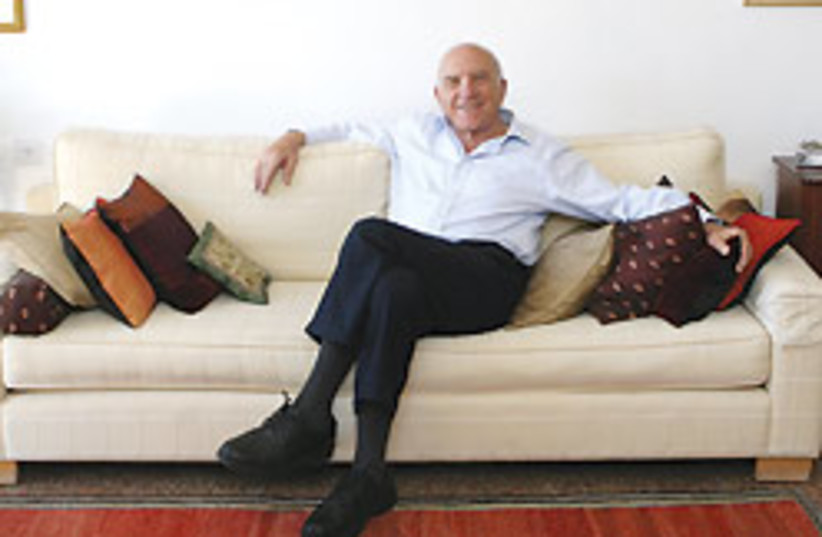The large funeral chamber at Eretz Haim cemetery in Beit Shemesh was filled to capacity. Chairs had been put out to supplement the twenty pews, but even so, people lined the walls on both sides and spilled out into the lobby.
They had come to honor Avraham Avi-Hai, a man of many paths that collectively came under the umbrellas of the Jewish world and the Zionist enterprise.
Theose who came represented some of the different signposts in his life and the many paths he had taken. A few even remembered him from the time when he was still called Syd Applebaum.
Israel and the Jewish people were important to him, even when he was a boy in Canada, where he was born, to a Toronto-based, Yiddish-speaking traditional family of Polish background on January 23, 1931.
He was a pivotal figure in the renewal of Hashomer Hadati, the religious Zionist youth movement that saw as its mission the building of religious kibbutzim in Israel.

The career of Avi-Hai
The movement merged with Bnei Akiva, and when Avi-Hai arrived in Israel in 1952 with his first wife, they initially lived in Kfar Darom, where he was a farmer and a construction worker.
But manual labor was not really his forte, and he moved to Jerusalem where he quickly launched a career in journalism, reporting on politics and economics. His first job in journalism was at The Jerusalem Post, where he was hired by Gershon Agron, the paper’s founding editor, who was later mayor of Jerusalem.
His next career move was to Israel Bonds, where Avi-Hai served as director and head of public relations at its Israeli office.
Impressed by Avi-Hai’s abilities, Teddy Kollek, who before becoming the legendary mayor of Jerusalem, worked closely with Israel’s founding prime minister David Ben-Gurion, recruited Avi Hai into government service. He was appointed director of the Overseas Division of the Prime Minister’s Office.
In later years, he was secretary for public affairs for former prime minister Levi Eshkol, working hand in glove with Yaakov Herzog, the uncle of Israel’s current president.
Part of their work involved persuading every religious stream in Judaism to set up its headquarters in Jerusalem so that the city would not only be the capital of Israel, but the capital of the Jewish people, regardless of nationality.
He helped the Conservative Movement in founding what is now the Schechter Institute of Jewish Studies, and aided the Reform movement in establishing Hebrew Union College. Both institutions are located in Jerusalem.
Avi-Hai spent 10 years as a speechwriter for Levi Eshkol, firstly when he was finance minister, and later when he was prime minister. When Eshkol was the first prime minister of Israel to officially visit the US, Avi-Hai was a member of his delegation.
It was at that time that he changed his name from a typical Diaspora one to an Israeli one – which he chose because it was the initials of his parents’ names; it also means, “my father lives.”
During the time that he worked with Eshkol, he took two years’ leave to continue his academic studies in the US, receiving degrees from the Jewish Theological Seminary and Columbia University, where he studied political science.
From the late 1960’s to the early 70’s, Avi-Hai organized the Prime Minister’s Economic Conference in Jerusalem, after which he moved into academia, becoming the founding dean of the Hebrew University’s School for Overseas Students.
He was also a visiting professor of history at the University of Rochester in the US, and taught political studies at the Hebrew University of Jerusalem, and at Bar Ilan University.
He never tired of promoting Jerusalem. During Kollek’s early years as mayor, Avi-Hai was involved in a news and feature service that was entirely dedicated to the city.
In 1976, he purchased an apartment in Yemin Moshe, which in the 1890’s had been the first Jewish neighborhood to be settled outside the walls of the Old City; it had been no man’s land between 1948 and 1967. Under Teddy Kollek, it was revived and renovated while retaining its old-world ambiance. Avi-Hai lived there for the rest of his life.
From 1976 to 1988, he served as chairman of the Keren Hayesod United Israel Appeal, which is the fund-raising arm of the Zionist Movement. During that time, he was also a member of the Jewish Agency for Israel and the World Zionist Organization.
An inspiring orator, with an authoritative, albeit pleasant voice, Avi-Hai also worked for Israel Radio and the Canadian Broadcasting Corporation, for which he covered the Eichmann trial.
In his twilight years, Avi-Hai returned to journalism, writing for both the Post and its flagship publication, The Jerusalem Report.
He also authored books, most recently his autobiography, which he wrote together with Ilan Evyatar, a former editor of the Report.
Unfortunately, Avi-Hai did not live to see it published. He passed away this past Sunday, December 2, at age 92. The book’s tentative title is: It all just happened.
Outside of work, who was Avi-Hai?
A charismatic personality, with an insatiable curiosity, Avi-Hai was also an ardent traveler who sometimes took family members with him abroad.
Further, he had a fine sense of humor, and an abiding interest in his three daughters, his grandchildren, and his great-grandchildren – and treated his two stepsons as if they were his own.
He was very proud of the fact that his four-generation family numbered in excess of 60 people.
Avi-Hai is survived by his wife Henrietta, his daughters Shosh, Tova, and Drorlee, his stepsons David and Daniel Bassan, grandchildren, and great-grandchildren.
